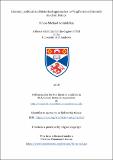Files in this item
Literary, political and historical approaches to Virgil's Aeneid in early modern France
Item metadata
| dc.contributor.advisor | Herdman, Emma | |
| dc.contributor.advisor | Buckley, Emma | |
| dc.contributor.author | Kay, Simon Michael Gorniak | |
| dc.coverage.spatial | 237 p. | en_US |
| dc.date.accessioned | 2018-06-08T09:02:34Z | |
| dc.date.available | 2018-06-08T09:02:34Z | |
| dc.date.issued | 2018-06-28 | |
| dc.identifier.uri | https://hdl.handle.net/10023/13837 | |
| dc.description.abstract | This thesis examines the increasing sophistication of sixteenth-century French literary engagement with Virgil’s Aeneid. It argues that successive forms of engagement with the Aeneid should be viewed as a single process that gradually adopts increasingly complex literary strategies. It does this through a series of four different forms of literary engagement with the Aeneid: translation, continuation, rejection and reconciliation. The increasing sophistication of these forms reflects the writers’ desire to interact with the original Aeneid as political epic and Roman foundation narrative, and with the political, religious and literary contexts of early modern France. The first chapter compares the methods of and motivations behind all of the sixteenth-century translations of the Aeneid into French; it thus demonstrates shifts in successive translators’ interpretations of Virgil’s work, and of its application to sixteenth-century France. The next three chapters each analyse adaptation of Virgil’s poem in a major French literary work. Firstly, Ronsard’s Franciade is analysed as an example of French foundation epic that simultaneously draws upon and rejects Virgil’s narrative. Ronsard’s poem is read in the light of Mapheo Vegio’s “Thirteenth Book” of the Aeneid, or Supplementum, which continues Virgil’s narrative and carries it over into a Christian context. Next, Agrippa d’Aubigné’s response to Virgilian epic in Les Tragiques is shown to have been mediated by Lucan’s Pharsalia and its anti- epic and anti-imperialist interpretation of the Aeneid. D’Aubigné’s inversion of Virgil is highlighted through comparison of attitudes to death and resurrection in Les Tragiques, the Aeneid and Vegio’s Antoniad. Finally, Guillaume de Salluste du Bartas’ combination, in La Sepmaine and La Seconde Sepmaine of the hexameral structure of Genesis with Virgil’s narrative of reconciliation after civil war is shown to represent the most sophisticated understanding of and most complex interaction with the Aeneid in sixteenth-century France. | en_US |
| dc.language.iso | en | en_US |
| dc.rights | Attribution-NonCommercial-NoDerivatives 4.0 International | * |
| dc.rights.uri | http://creativecommons.org/licenses/by-nc-nd/4.0/ | * |
| dc.subject | Virgil | en_US |
| dc.subject | Aeneid | en_US |
| dc.subject | Ronsard | en_US |
| dc.subject | Franciade | en_US |
| dc.subject | D'Aubigne | en_US |
| dc.subject | Tragiques | en_US |
| dc.subject | Du Bartas | en_US |
| dc.subject | La Sepmaine | en_US |
| dc.subject | La Seconde Sepmaine | en_US |
| dc.subject | Lucan | en_US |
| dc.subject | Pharsalia | en_US |
| dc.subject | Vegio | en_US |
| dc.subject | Maffeo | en_US |
| dc.subject | Vegius | en_US |
| dc.subject | Mapheus | en_US |
| dc.subject | Supplementum | en_US |
| dc.subject | Thirteenth Book | en_US |
| dc.subject | Antoniad | en_US |
| dc.subject | Civil war | en_US |
| dc.subject | Wars of Religion | en_US |
| dc.subject | Early modern France | en_US |
| dc.subject | Sixteenth century France | en_US |
| dc.subject | Translation | en_US |
| dc.subject | Huguenots | en_US |
| dc.subject | Catholic | en_US |
| dc.subject | Epic | en_US |
| dc.subject | Anti-epic | en_US |
| dc.subject.lcc | PQ239.K2 | |
| dc.subject.lcsh | Virgil. Aeneis | |
| dc.subject.lcsh | Virgil--Influence | en |
| dc.subject.lcsh | Virgil--Translations into French--History and criticism | en |
| dc.subject.lcsh | Virgil--Appreciation--France--History--16th century | en |
| dc.subject.lcsh | French literature--16th century | en |
| dc.subject.lcsh | France--Intellectual life--16th century | en |
| dc.subject.lcsh | Politics and literature--Europe--History--16th century | en |
| dc.title | Literary, political and historical approaches to Virgil's Aeneid in early modern France | en_US |
| dc.type | Thesis | en_US |
| dc.contributor.sponsor | University of St Andrews. 600th Anniversary Scholarship | en_US |
| dc.type.qualificationlevel | Doctoral | en_US |
| dc.type.qualificationname | PhD Doctor of Philosophy | en_US |
| dc.publisher.institution | The University of St Andrews | en_US |
| dc.rights.embargoreason | Embargo period has ended, thesis made available in accordance with University regulations | en |
| dc.identifier.doi | https://doi.org/10.17630/10023-13837 |
The following licence files are associated with this item:
This item appears in the following Collection(s)
Except where otherwise noted within the work, this item's licence for re-use is described as Attribution-NonCommercial-NoDerivatives 4.0 International
Items in the St Andrews Research Repository are protected by copyright, with all rights reserved, unless otherwise indicated.


